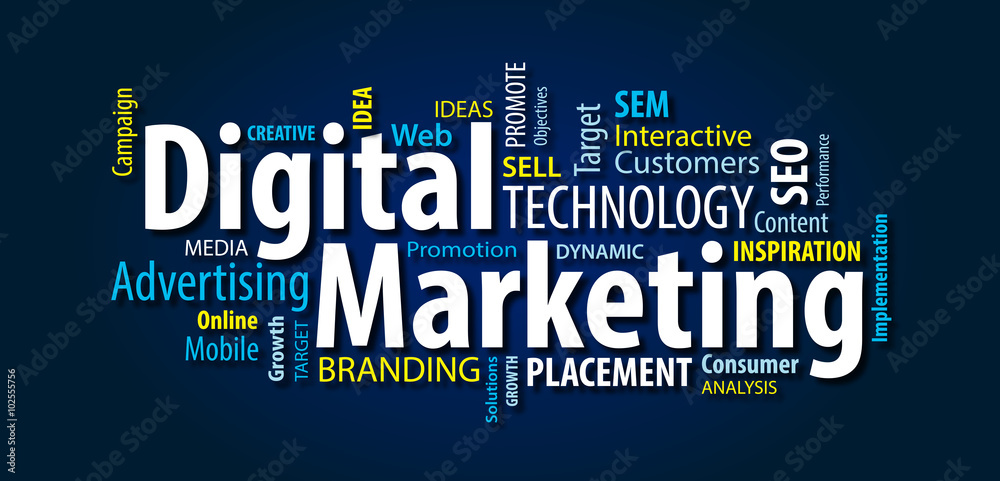What is Digital Marketing?
Digital marketing refers to the practice of promoting products, services, or brands using digital channels and technologies. It is a dynamic and ever-evolving field that leverages online platforms, social media, search engines, email, and other digital mediums to connect with a target audience. Unlike traditional marketing, digital marketing provides real-time analytics and insights, enabling businesses to adapt their strategies quickly to achieve better results.


In today’s technology-driven world, digital marketing has become essential for businesses of all sizes. It allows companies to reach a global audience, create personalized experiences, and engage with customers in meaningful ways. Whether you are a small business owner or a multinational corporation, digital marketing offers tools and strategies to achieve your marketing goals effectively and efficiently.
Types of Digital Marketing
Digital marketing encompasses various strategies and techniques. Here are the most prominent types:
- Search Engine Optimization (SEO): SEO involves optimizing your website to rank higher in search engine results pages (SERPs). By improving visibility on platforms like Google, businesses can attract organic traffic. This includes on-page SEO (content optimization), off-page SEO (backlinks), and technical SEO (site speed and mobile-friendliness).
- Content Marketing: Content marketing focuses on creating and sharing valuable, relevant, and consistent content to attract and retain a target audience. Blogs, articles, infographics, videos, and eBooks are examples of content marketing that can establish authority and drive engagement.
- Social Media Marketing (SMM): Social media marketing uses platforms like Facebook, Instagram, Twitter, LinkedIn, and TikTok to promote brands and engage audiences. Businesses can use organic posts, paid ads, and influencer collaborations to amplify their reach.
- Pay-Per-Click Advertising (PPC): PPC advertising involves paying a fee each time someone clicks on your ad. Platforms like Google Ads and social media networks allow businesses to run highly targeted campaigns based on demographics, interests, and search intent.
- Email Marketing: Email marketing is a powerful tool for nurturing relationships with potential and existing customers. Personalized email campaigns can deliver promotional offers, updates, and valuable content directly to the inbox.
- Affiliate Marketing: Affiliate marketing allows businesses to partner with affiliates who promote their products or services. Affiliates earn a commission for every sale or lead generated through their marketing efforts.
- Influencer Marketing: Collaborating with influencers who have a significant following can help brands reach their target audience more effectively. Influencers can create authentic content and endorse products to build trust.
- Mobile Marketing: Mobile marketing targets users on smartphones and tablets through apps, SMS, push notifications, and mobile-friendly websites. With the rise of mobile usage, this type of marketing is more relevant than ever.
- Video Marketing: Video marketing utilizes platforms like YouTube, Instagram Reels, and TikTok to deliver engaging video content. Videos can showcase product demonstrations, tutorials, testimonials, and brand stories.
- Online Public Relations (PR): Online PR involves managing a brand’s reputation and building relationships with online influencers and media outlets. Press releases, online reviews, and interviews contribute to a positive online presence.
How Digital Marketing Can Be Used Nowadays
In today’s fast-paced digital landscape, digital marketing serves as the modus operandi for businesses to achieve various objectives:
- Reaching a Wider Audience: With billions of Internet users, digital marketing enables businesses to expand their reach beyond geographical boundaries. Social media platforms, for example, allow brands to engage with audiences worldwide.
- Personalization: Digital marketing tools enable businesses to create personalized experiences for their customers. From tailored email campaigns to product recommendations based on browsing history, personalization increases customer satisfaction and loyalty.
- Cost-Effectiveness: Digital marketing campaigns are often more affordable than traditional marketing methods like TV or print ads. Small businesses can compete with larger players using targeted strategies.
- Real-Time Engagement: Social media platforms and live chat features allow businesses to interact with customers in real time, addressing their concerns and building strong relationships.
- Data-Driven Decisions: Analytics tools provide insights into customer behavior, campaign performance, and market trends. This data helps businesses optimize their strategies and allocate resources effectively.
- Increased Sales and Revenue: By using techniques like retargeting ads and email marketing, businesses can convert leads into paying customers, boosting sales and revenue.
- Building Brand Authority: Consistently delivering valuable content and engaging with audiences helps businesses establish themselves as industry leaders, fostering trust and credibility.
- Adaptability: Digital marketing allows businesses to adapt to changing consumer preferences and market conditions quickly, ensuring they stay ahead of competitors.

